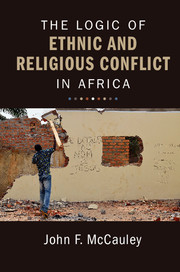Book contents
- The Logic of Ethnic and Religious Conflict in Africa
- The Logic of Ethnic and Religious Conflict in Africa
- Copyright page
- Dedication
- Contents
- Figures
- Tables
- Abbreviations
- Preface and Acknowledgments
- Part I
- 1 Introduction
- 2 A Theory of Mobilizational Differences in Identity Types
- 3 Evidence from Côte d’Ivoire and Ghana
- 4 Observable Implications
- Part II
- Appendixes
- Bibliography
- Index
4 - Observable Implications
from Part I
Published online by Cambridge University Press: 09 May 2017
- The Logic of Ethnic and Religious Conflict in Africa
- The Logic of Ethnic and Religious Conflict in Africa
- Copyright page
- Dedication
- Contents
- Figures
- Tables
- Abbreviations
- Preface and Acknowledgments
- Part I
- 1 Introduction
- 2 A Theory of Mobilizational Differences in Identity Types
- 3 Evidence from Côte d’Ivoire and Ghana
- 4 Observable Implications
- Part II
- Appendixes
- Bibliography
- Index
Summary
- Type
- Chapter
- Information
- The Logic of Ethnic and Religious Conflict in Africa , pp. 76 - 92Publisher: Cambridge University PressPrint publication year: 2017



